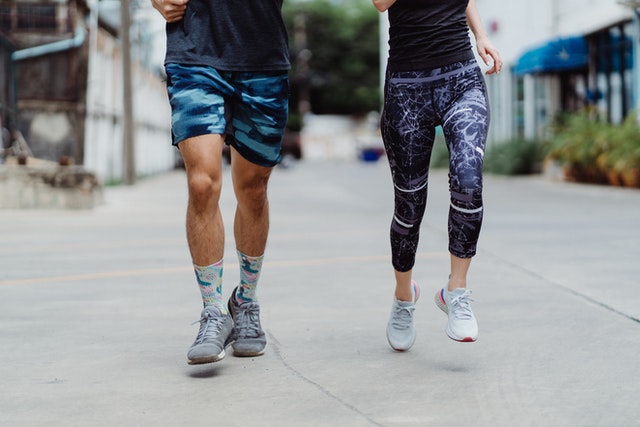Do you want to go back in time? Start sweating off the years instead of using lotions and potions.
A consistent exercise program has significant benefits: it can help you create stronger muscles, prevent chronic illnesses, and make your clothes fit better. But there’s another advantage to physical activity that has to be mentioned: the fact that even moderate amounts of it seem to take years off your age, regardless of how many birthdays you’ve had. Of course, you can’t change your chronological age, but exercise can enhance your health to the point where you look and feel younger than you are. Take a look at the 15 physical and mental benefits of sweating on your brain and body. Simply reading this list will inspire you to take action.
Exercise keeps your skin soft and glowing
Fitness may maintain your skin youthful in ways more than just giving it a dewy sheen from all the sweat dripping off your forehead onto your cheeks. A small group of adults between the ages of 20 and 84 were evaluated by researchers at McMaster University in Ontario. The skin of the regular exercisers beyond the age of 40 mirrored the suppler, more elastic skin of those in their 20s and 30s. The research group hypothesized that exercise produces body substances that help slow aging in skin, though they say more research is necessary to understand how exercise changes skin composition. The difference had nothing to do with sun exposure, which would age your skin faster if you didn’t wear sunscreen, they reported.
Exercise improves your flexibility
Aging makes your muscles and joints more rigid, leaving you feeling stiff and creaky in addition to making your opinions more rigid. Regular exercise keeps you flexible and loose, especially stretching-focused exercises like yoga and Pilates. If you prefer cardio activities, you may still increase your flexibility by warming up and cooling down with foam roller movements.
Exercise boosts your mood
You may have heard of the runner’s high, which may occur during any cardiac exercise that makes you sweat. Endorphins, the bodily compounds your body produces while you are active, appear to be the key. Endorphins are similar to natural opiates. According to some research, exercise can cause changes in other neurotransmitters, such dopamine, that are connected to happy emotions. Additionally, the boost in confidence you experience makes you happy.
Exercise increases your vigor and vitality
A exercise revs up your body and mind to make you feel more awake and alive, much like nature’s energy drink. Exercise awakens your body, which gives you more energy and a better sense of wellbeing. Daily activities get easier and exertion requirements decrease. It gives you the impression that you have aged by a decade or two because of the spring in your step.
Exercise improves your posture
As you age, your posture deteriorates as a result of muscle loss and changes in bone density. Strength training, which improves bone and muscle health, especially in the core and along the spine, can offset this so that you appear younger and stand taller naturally. Working out also increases your psychological power, which naturally causes you to straighten up and quit hunching over.
Exercise improves memory
It’s common to become forgetful as we age. However, evidence indicates that exercising can help you overcome brain fog. The hippocampus, a region of the brain connected with memory, appears to grow larger with regular aerobic exercise, according to research published in the British Journal of Sports Medicine in 2014. Previous studies have also connected exercise to improved cognitive function. Nowadays, if you’re having more senior moments, turn them down by hopping on the treadmill.
Exercise helps you maintain a high metabolism
As you become older, your metabolism naturally slows down, making it difficult to stop the pounds from creeping on. Fortunately, scheduling frequent workouts helps you burn more calories overall, which aids in maintaining a constant, healthy weight. Since using free weights or bodyweight workouts helps increase muscle mass, adding resistance training to your program at least a few times each week will help you burn more calories. Calorie burn also increases with muscle mass. And it continues to rise throughout the day, even after you stop exercising.
Exercise promotes restful sleep
Exercise enables you to get the kind of restful sleep which is like a fountain of youth. According to research, frequent exercisers are more likely to experience deep REM sleep and can fall asleep more quickly. You get exhausted after a vigorous workout, but there’s more to it than that. As all of your body’s functions perform better when you get enough sleep, you’re less likely to experience stress and then toss and turn all night. According to a recent study, exercising at least 150 minutes of exercise per week increased sleep quality by 65%.
Exercise reduces the aging of cells
Exercise may actually stop your chromosomes from aging, which would go beyond merely making you feel younger. Telomeres, the caps at the ends of chromosomes that regulate aging, are involved. As you age, your telomeres get shorter, and longer telomeres are linked to longevity. Recent research has linked regular exercise to telomere lengthening, suggesting that exercise may help you live longer by slowing down the aging process. While exercising won’t ensure a long life, it can significantly increase your chances.
Exercise helps to burn belly fat
Fat that used to mostly reside on your hips and thighs begins to shift toward your belly as you approach middle age; this is especially true after menopause. This so-called visceral fat, in contrast to fat on other body parts, can raise your chance of developing chronic illnesses like diabetes and heart disease. Although it is tenacious, frequent aerobic workouts seem to lessen or eliminate it. According to a 2011 Duke University study, cardio exercises can help people lose more belly fat than exercises that combine strength training and cardio.
Exercise relieves stress
You can get rid of stress and anxiety by going for a long run outside or taking a lovely trek. But the fact that exercise reduces stress levels may have a physiological basis. The endorphin release brought on by exercise has a calming impact and lowers anxiety. Along with getting your body moving, more meditative forms of exercise like yoga or Tai Chi also promote mindfulness. It is much more difficult to mentally freak out about a difficult job project or that argument you had with a friend last night when you remain in the present and concentrate on your breathing and pulse rate.
Exercise improves your blood flow
Not only can joints stiffen with age, but your blood vessels may also become less flexible. Because of this, it is more difficult for them to expand and contract as necessary to carry oxygen-rich blood to the body areas that require it the most (like the brain, heart, and muscles.) Your blood pressure may also increase as a result of stiffer arteries, which forces your heart to work harder to pump blood through them. Exercise helps lower blood pressure and improve circulation, and some studies indicates that even basic stretching, such as what is done in yoga, Pilates, or any other stretching routine, can assist increase blood vessel flexibility.
Exercise helps to prevent heart disease
Regular exercise also lowers your risk of developing age-related cardiac issues including high blood pressure and high triglyceride levels, a form of blood fat that can harden or clog arteries. According to the CDC, both have a significant impact on heart disease, which is the leading cause of death for both men and women. Exercise raises levels of HDL, or good cholesterol, which safeguards against cardiovascular disease.










